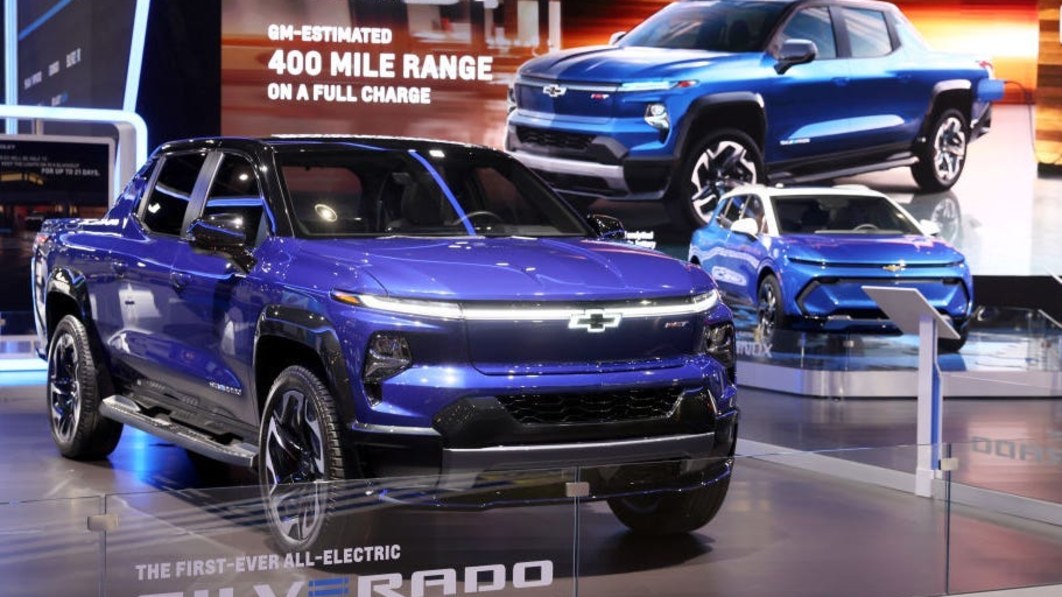- Chevrolet is hopeful its offerings will break through in a new EV market.
- Flooding the zone has worked with gas-powered cars.
- Gas-powered cars and hybrids can fill in the gaps while the EV market adjusts.
Chevrolet’s new lineup of electric vehicles is arguably showing up at the worst possible time.
After a few years of rapid growth, EV sales are hitting a plateau. This has led to massive changes in EV strategies at most major automakers, with many now pivoting to hybrids.
And yet, Chevrolet Chief Marketing Officer Steve Majoros doesn’t seem worried about the company’s chances in this new EV market. He sat down with Business Insider last week at a press event for the launch of two electric vehicles: the Silverado electric pickup truck and the Chevy Equinox EV.
“I think it actually benefits Chevrolet,” Majoros says of the changing EV market, which is now dominated by more frugal and practical customers — Chevy’s bread and butter. Given that, he says, Chevrolet is pressing forward with EVs in hopes that their offerings can break through.
This lean-in approach is a classic strategy for a mass-market brand like Chevy. For years, Chevrolet has offered a wide range of pickup trucks, SUVs, and crossovers to meet demand for a huge swath of customers.
Simply by slotting vehicles in a segment and at a certain price point, Chevrolet, typically the third-largest brand in the US after Ford and Toyota, is able to siphon off market share from competitors and grow its volume.
It appears the brand is taking the same approach with its EVs, but it could turn out to be a risky move.
Chevy’s first attempt at electrifying an existing nameplate – the Blazer EV – got off to a rocky start with a stop-sale related to software issues. Majoros insisted Blazer EV is recovering and notched impressive monthly sales, but didn’t provide specifics since GM no longer shares monthly sales numbers.
Chevy is banking on more EV options leading to more buyers
Chevrolet is banking on the conventional wisdom in the automotive industry that half the battle of converting a customer to an EV is getting them in front of the vehicle.
Majoros offers a point of proof that a flood-the-zone approach might be working: Dealers and their employees – often the first to experience these electric cars – are also among Chevy’s most reliable early EV adopters.
Majoros offers a point of proof that a flood-the-zone approach might be working: Dealers and their employees – often the first to experience these electric cars – are also among Chevy’s most reliable early EV adopters.
“We’re talking to a lot of first-time EV buyers with the Blazer EV, and a lot of them are dealership employees,” Majoros said. “They get the first look at these cars, they test drive them and realize, ‘This thing’s pretty damn good.'”
Dealers and their employees buying up their own EV supply isn’t necessarily a new phenomenon. Many of them see EV ownership as a requirement for selling these high-tech cars in order to speak with authority about the experience of driving, charging, and daily maintenance.
Dealers who own EVs are often enthusiastic about their battery-powered cars, but the trouble comes when trying to convince their customers. Factors like steep upfront costs, quirks of ownership, and overall lifestyle changes required to replace a gas-powered car with an EV keeps an entire swath of customers out of the battery-electric segment, dealers say.
Majoros concedes those points but thinks Chevy is poised to change a lot of minds with its new mass-market lineup of EVs. The Equinox, in particular, slots into the current EV market well, with a starting price of $43,295 and an estimated range of 319 miles.
“We’re on the precipice of this click for a lot of customers,” Majoros said. “Every year, or even every month, more people own EVs, talk about them with their friends or coworkers—all those factors add up for a brand like Chevrolet.”
More EVs doesn’t have to mean fewer gas-powered or hybrid cars
While Chevrolet waits for this “click” to happen, Majoros points out that the brand still has plenty of gas-powered cars to keep dealer lots humming. He also pointed to GM’s plans to integrate hybrids into the U.S. market but didn’t offer a timeline for those releases.
GM isn’t the only automaker relying on its gas-powered profits to shepherd it through this EV slowdown. Other legacy car companies are pulling back on EV goals, leaning harder into hybrids, and relying on the success of traditional gas guzzlers to offset losses in the still unprofitable EV business.
Chevrolet’s dealers “have that reassurance of a pretty good and steady base of internal combustion engine product,” Majoros told a group of journalists. “We are going nowhere in that space.”







